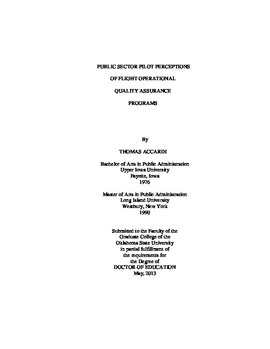| dc.contributor.advisor | Marks, Steven Ken | |
| dc.contributor.author | Accardi, Thomas | |
| dc.date.accessioned | 2014-09-24T14:16:24Z | |
| dc.date.available | 2014-09-24T14:16:24Z | |
| dc.date.issued | 2013-05 | |
| dc.identifier.uri | https://hdl.handle.net/11244/10952 | |
| dc.description.abstract | A Flight Operational Quality Assurance (FOQA) program monitors pilots by storing hundreds of flight parameters i.e. speed, altitude, instrument readings etc. retrievable for playback. Thus, FOQA is a powerful aviation safety tool, but FOQA has also raised critical data-protection issues regarding its use for disciplinary or FAA actions, and/or release to outside entities for civil or criminal litigation. | |
| dc.description.abstract | The FAA has a strong desire to expand FOQA, however only 17% of smaller air operators have voluntarily adopted it, and little is known about pilot perceptions of FOQA. Technology improvements and cost reductions have enabled its adoption. The General Accountability Office has maintained negative pilot perceptions are a barrier to further adoption of FOQA. | |
| dc.description.abstract | This is the first comparative research to study pilot perceptions of FOQA. This research hypothesized that public sector pilots flying under a FOQA program would have more positive perceptions, and lower negative perceptions, of FOQA than their counterparts not flying under a FOQA program. No significant differences were found on either the positive perceptions scale, t(185)=.24, p=.81, or the negative perceptions scale t(185)= 1.56, p=.12. A one-way ANOVA indicated that education level did not have a significant relationship with either positive, F(3.178)=.69, p=.56, or negative, F(3.179)=1.04, p=.38 , perceptions of FOQA. | |
| dc.description.abstract | It was hypothesized that pilots with FOQA experience would have higher positive perception scale scores, and lower negative perception scale scores, than pilots operating without FOQA experience. The one-tailed point-biserial correlation indicated that there was no significant relationship between positive, rpb(142)=.09, p= .14, or negative rpb(142)=-.16, p= .03, perceptions with FOQA experience. | |
| dc.description.abstract | Public sector small air operators operate in a variety of environments that pose risk to safe operations. FAA's promotion of safety data analysis by air operators through voluntary adoption of FOQA has stalled. If FAA desires to retain global leadership in flight data analysis and safety risk management, they should initiate new action to reenergize broader adoption of FOQA including the protection of sensitive safety information from litigation discovery, and the reevaluation of FOQA as a voluntary safety program. | |
| dc.format | application/pdf | |
| dc.language | en_US | |
| dc.rights | Copyright is held by the author who has granted the Oklahoma State University Library the non-exclusive right to share this material in its institutional repository. Contact Digital Library Services at lib-dls@okstate.edu or 405-744-9161 for the permission policy on the use, reproduction or distribution of this material. | |
| dc.title | Public sector pilot perceptions of flight operational quality assurance programs | |
| dc.contributor.committeeMember | Kutz, Marks | |
| dc.contributor.committeeMember | Hansen, Frederick D. | |
| dc.contributor.committeeMember | Ausburn, Lynna J. | |
| osu.filename | Accardi_okstate_0664D_12666.pdf | |
| osu.accesstype | Open Access | |
| dc.type.genre | Dissertation | |
| dc.type.material | Text | |
| thesis.degree.discipline | Applied Educational Studies | |
| thesis.degree.grantor | Oklahoma State University | |
